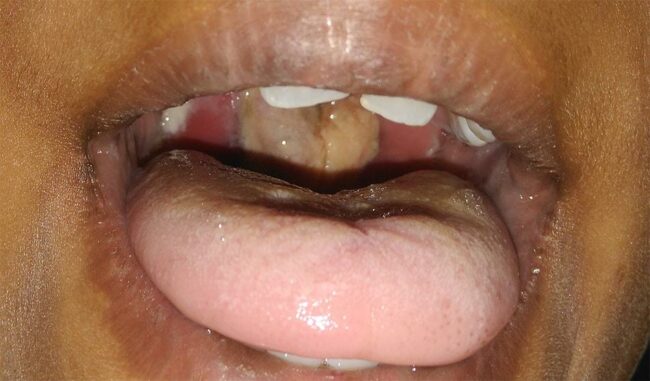Federal Government through the National Center for Disease Control and Prevention (NCDC) has disclosed that it is currently finalising the development of the National Diphtheria Laboratory Guidelines as part of its efforts to contain the outbreaks.
The Director General of NCDC, Dr Ifedayo Adetifa while disclosing this on Tuesday at a joint press by NPHCDA and NCDC also disclosed that currently, there are 14 laboratories in the Diphtheria Laboratory Network with capacity to support diphtheria testing and optimisation of five additional laboratories at the subnational is currently ongoing
A breakdown by states showed that Kano has 86 per cent of the disease burden with 7,188 cases; Yobe – 775; Katsina – 232; Borno – 118; Jigawa -23; Bauchi -20; Kaduna – 17; Lagos – 8; FCT – 6; Gombe – 5; Osun – 3; Sokoto – 3; Niger – 2; Cross River – 1; Enugu – 1; Imo – 1; Nasarawa – 1; Zamfara – 1; Kebbi –1.
Of the 8,406 confirmed cases, 6,202 (73.7 per cent) were aged 1 to 14 years.
“Our records have shown that most of the confirmed cases of diphtheria in the country were unvaccinated against diphtheria. Of the 8,406 confirmed cases, 5,371 (64 per cent) are either unvaccinated or partially vaccinated, 966 (11 per cent) with unknown vaccination status while 2,069 (25 per cent) are fully vaccinated against diphtheria,” Adetifa stated.
Adetifa said: “We have conducted training for laboratory personnel at the sub-national level on laboratory diagnostic processes, quality assurance, biosafety and biosecurity procedures, and data management.
“With the support of our partners including UKHSA, WHO and MSF we have been able to conduct refresher training for the deployed National Rapid Response Team laboratory personnel.”
“Currently, there is an ongoing installation of laboratory equipment (biosafety cabinets, autoclaves, and incubators) in Kaduna, Katsina and Bauchi states to aid the optimisation of labs in the States.”
“There is also continuous provision of technical support to public health laboratory scientists across States.” He stated.
On risk communication and engagement, Adetifa said NCDC has continued to develop and disseminate public health advisories on diphtheria.
He said with the support of the World Bank, Breakthrough Action Nigeria and other partners, the agency has been able to design, validate and distribute diphtheria social behavioral change (SBC) materials to all states.
“We continue to engage with state officials on the adaptation of diphtheria SBC materials (e-posters, flyers and jingles) to their local languages.”
“We embark on regular media engagement such as this to proactively inform the public on raising awareness and addressing misconceptions on the diphtheria outbreak,” he stated.
On case management, Adetifa further said, the agency has developed and disseminated Standard Operating Procedures for Diphtheria Antitoxin (DAT) use in health facilities and treatment centres.
“With support from partners and in collaboration with the State Ministry of Health, we have established Diphtheria Treatment Centres/Wards in affected States.
“For the first time in any outbreak, the government has made DAT and now IV erythromycin available using its resources through the REDISSE funding and also supported by partners including WHO and MSF. These have resulted in a significant reduction in case fatality rate from about 40% during the earlier part of the outbreak when access to DAT was highly limited to about 6% now.”
Meanwhile, the Executive Director of NPHCDA, Dr Faisal Shuaib said in recent months, NPHCDA has launched rapid and comprehensive vaccination campaigns across the affected regions.
He explained that those campaigns have been meticulously planned and executed, with a laser focus on the epicenter of the outbreak.
According to him, “Kano, as the epicenter of this outbreak, has been at the forefront of our vaccination efforts. Working with the State Governments, we implemented rounds 1 and 2 of the vaccination campaign in five high-burden Local Government Areas (LGAs) in February and April 2023 respectively.
“Subsequently, round 3 was integrated with routine immunization intensification, further bolstering our response. An additional 8 LGAs in Kano underwent reactive vaccination exercises in the last week of August.
“Beyond Kano, we expanded our response to include Kaduna, Katsina, Bauchi, and Yobe in our Phase One response. These states engaged, trained, and executed vaccination campaigns in 25 high-burden LGAs within their borders with the commencement of reactive vaccination in August 2023. Borno State also conducted reactive vaccination exercises in four LGAs during the same period.”
“It is crucial to note that routine vaccination continues daily at all government facilities across the nation. The reactive vaccination exercises just serves as an additional layer of effort, a testament to the commitment of the Federal Government and our partners to curb the spread of this infection.
“For the Phase One response conducted in August 2023, significant numbers were reached. In Kano State alone, 476,962 children received TD vaccines, while 28,700 children received Penta vaccines.
“For other states, Katsina, had 313,615 children vaccinated with Penta vaccines and 421,045 with Td vaccines; Bauchi, vaccinated 162,840 children with Penta and 257,075 with Td vaccines; Kaduna, reached 174,857 children with Penta and 245,805 with Td vaccines. Yobe, vaccinated 82,601 children with Penta and 207,418 with Td vaccines. These figures do not include the daily routine vaccination efforts ongoing in these states.”
“As of September 23rd, 2023, we commenced the Phase 2 Round 1 Diphtheria outbreak response in seven of the high-burden states. Yobe began on September 23rd, followed by Kano on September 30th. Bauchi, Borno, Jigawa, Kaduna, and Katsina are poised to commence on October 7th, 2023,” he said.
READ ALSO FROM NIGERIAN TRIBUNE






